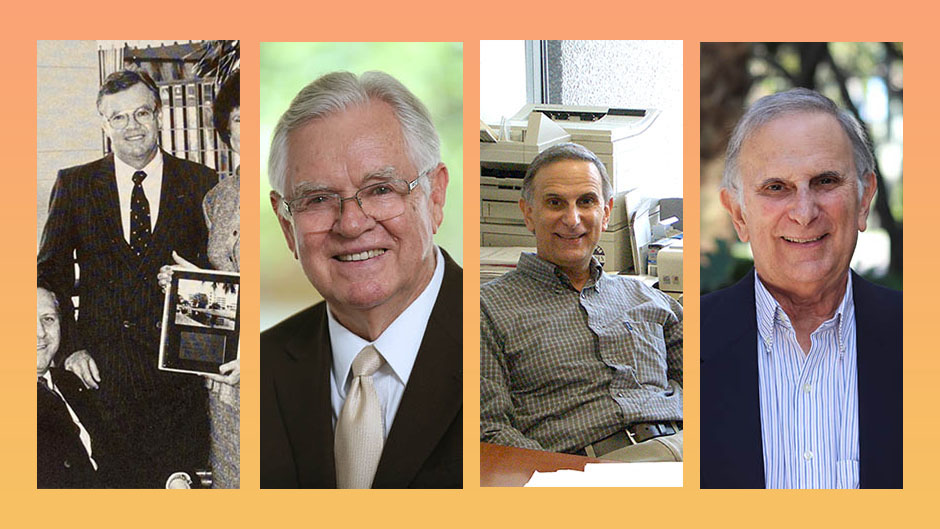Combined, Professors Philip Robins and Michael Connolly have more than 70 years of experience in teaching economics at the University.
“I love teaching Miami Herbert students because they are very interested in relating basic economic principles to the running of a business,” said Robins. “The overlap among the various disciplines that our students are exposed to such as finance, marketing, management, and management science make it a truly enjoyable and relatable interdisciplinary teaching experience.”
Connolly said regardless of the changing trends and technology, one thing has always remained the same—the caliber of students and how much they value the education they are receiving.
When did you being teaching at UM?
Connolly: I began teaching at UM in 1987.
Robins: I began teaching at UM in August of 1982, so I have been here for almost 39 years. Before coming to UM, from 1972-1982, I taught part-time while I was a senior economic researcher at SRI International in Menlo Park, Calif. Before that, I was a research economist at the Federal Reserve Bank of Chicago.
How has your teaching evolved over the years, especially alongside the break-neck speed of technological developments?
Connolly: My teaching has gone from printed handouts to posting PPT lecture slides on BlackBoard; and from pencil and paper to Excel and Stata. The biggest and fasted shift happened during the spring 2020 semester when we all went to remote teaching because of the COVID-19 pandemic. Miami Herbert immediately provided seminars, training, and resources for delivering classes remotely. I am extremely grateful to the School for their significant investment in faculty training and toward safely conducting classes for both faculty and students.
Robins: As with most everybody else who had been teaching prior to the technology revolution, my teaching style changed from writing on blackboards and handing out printed materials to using PowerPoint and web sources to conduct my classes.
What do you love most about teaching economics?
Connolly: It is lively, never boring!
Robins: I love teaching economics because it is so easily tied to real-world politics and economic policy making. I have always been an empirical economist and I love when students are able to see the real-world relevance of what is mostly being taught as a theoretical subject.
What years were the most exciting to teach economics because of events happening around the world?
Connolly: The period starting in 1979 to the present has been the most exciting with Deng Xiaoping’s opening trade and investment in China, and its movement toward the free market, property law, and foreign direct investment. Xiaoping laid the foundation for privatization of many state-owned enterprises and the protection of private property. In this time, China moved from mostly socialism to mostly capitalism in a great successful experiment. This experiment changed economic institutions and unleashed real GDP growth per capita of 11% in real terms from 1980 to 2019 from a low 6% from 1960 to 1980, nearly doubling the growth rate. Poverty has not ended, but policies to improve education at all levels are helping.
Robins: The Reagan years were particularly exciting because of the dramatic shift in economic thinking in the country during that time from what had basically been a Keynesian active government approach to public policy to a Milton Friedman free market approach with limited government. Reaganomics and “trickle-down economics” (which I don’t agree with) made for many lively discussions in my classes. Then, there was the four tumultuous years of President Donald Trump where economic rationale was rarely (if ever) used to make public policy decisions and where “trickle-down economics” again came to the forefront. It was exciting to discuss how many of Trump’s policies, such as the futile trade war with China and the monumental tax cuts of 2017, were at odds with basic economic principles.
How does majoring in economics prepare students for success in their lives and careers?
Connolly: Majoring in economics is a good platform for reasoning–there is no free lunch is a good start – as well as a platform for graduate studies in most fields, especially business school.
Robins: One major objective of training in economics is to show how economic incentives drive successful consumer and business decisions. By learning how individual consumers and businesses respond to economic incentives, students are prepared to make rational decisions in their everyday lives. I find that students who major in economics and pursue a business career are at an advantage over students who have only limited economics training. In addition, majoring in economics also prepares students for a variety of careers other than business, such as jobs in the public sector, journalism, or organizations that specialize in economic research.
What was your favorite subject or class when you were in college?
Connolly: Principles of Economics where I learned David Ricardo’s theory of comparative advantage.
Robins: Besides classes in my economics major, my favorite subject in college was Art History, particularly classes covering the Long Renaissance period from the 14th to the 17th century. I found that taking an analytical approach to understanding art during this period made it a fascinating subject to study.
Favorite economist of all time?
Connolly: Milton Friedman, an unapologetic champion of Adam Smith, author of “The Wealth of Nations” and a proponent of the concept of free market. I recommend his three-minute video, in which he points out the remarkable degree of cooperation between people from different countries, who’ve never even met, to make what appears to be a very simple product – a pencil.
As to what the future holds, Connolly says teasching is too much fun. "There's always somehing new! The key to a long, and hopefully productive, career in academics is to love what you are doing and try to teach an honest course where we all learn something." He just published the 3rd edition of “International Financial Management” with Peking University Press.

